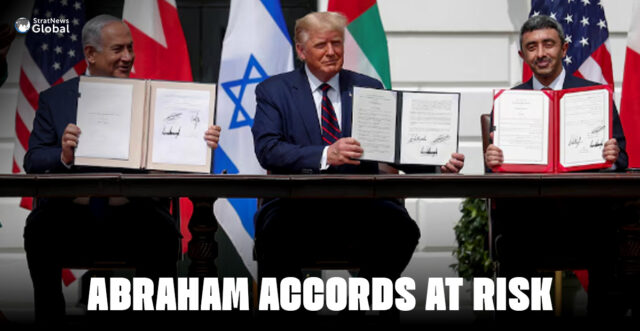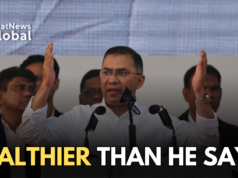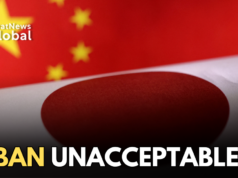The United Arab Emirates (UAE) may downgrade diplomatic relations with Israel if Prime Minister Benjamin Netanyahu’s government proceeds with annexing parts or all of the Israeli-occupied West Bank, three sources familiar with the Gulf state’s deliberations said.
UAE is one of just a few Arab states with diplomatic relations with Israel, and downgrading ties would be a major setback for the Abraham Accords – a signature foreign policy achievement of U.S. President Donald Trump and Netanyahu.
Israel’s government has recently taken steps that could presage annexation of the West Bank, which was captured along with East Jerusalem in a war in 1967. The United Nations and most countries oppose such a move.
For Netanyahu, whose coalition relies on right-wing nationalist parties, annexation could be seen as a valuable vote-winner before an election expected next year.
Not All Ties Likely To Be Cut
Abu Dhabi warned Netanyahu’s right-wing coalition this month that any annexation of the West Bank would be a “red line” for the Gulf state, but did not say what measures could follow.
The UAE, which established ties with Israel in 2020 under the Abraham Accords, was considering withdrawing its ambassador in any response, the sources told Reuters.
The sources, who all spoke on condition of anonymity, said Abu Dhabi was not considering completely severing ties, although tensions have mounted during the almost two-year-old Gaza War.
A source in Israel said the government believed it could repair its strained ties with the UAE, a major commercial centre seen as the most significant of the Arab states to establish ties with Israel in 2020. The others were Bahrain and Morocco.
No other Arab state has since established formal ties with Israel, which also has diplomatic relations with Egypt and Jordan, and direct contacts with Qatar, though without full diplomatic recognition. Once-thriving business ties between the UAE and Israel have cooled due to the Gaza war, and Netanyahu has yet to visit the Gulf state five years after establishing ties.
Israeli Companies Barred From UAE Airshow
In a sign of growing tension with Israel, the Gulf state last week decided to bar Israeli defence companies from exhibiting at the Dubai Airshow in November, three of the sources said. Two other sources, an Israeli official and an Israeli defence industry executive, confirmed the decision.
Israel’s defence ministry said it had been made aware of the decision but did not elaborate. A spokesperson for the Israeli embassy in Abu Dhabi said discussions over Israel’s participation in the week-long trade show were continuing.
Israel’s media were the first to report the move to block the firms from the UAE’s flagship aerospace and defence event.
The UAE foreign ministry did not respond to questions on whether it was weighing downgrading diplomatic ties with Israel.
The spokesperson at the Israeli embassy in Abu Dhabi said that Israel was committed to the Abraham Accords and that it would continue to work towards strengthening ties with the UAE.
Emirati foreign ministry official Lana Nusseibeh had told Reuters and Israeli media on September 3 that any annexation of the West Bank would jeopardise the Abraham Accords and end the pursuit of regional integration.
That warning preceded Israel’s air strike on Qatar last week, which targeted Hamas leaders, an attack that Anwar Gargash, diplomatic adviser to UAE President Sheikh Mohamed bin Zayed Al Nahyan, condemned as treacherous.
At an emergency meeting of Muslim nations in Qatar, convened in response to the strike, a communique was issued urging countries to review diplomatic and economic ties with Israel.
As part of the Abraham Accords, Netanyahu promised to hold off on annexing the West Bank for four years. But that deadline has passed, and some Israeli ministers are now pressing for action.
Finance Minister Bezalel Smotrich this month said that maps were being drawn up to annex most of the West Bank, urging Netanyahu to accept the plan. Itamar Ben-Gvir, the national security minister, also backs annexing the territory.
Ties With Israel Deteriorated After 2023
After establishing ties, the UAE and Israel built a close relationship, focusing on economic, security and intelligence cooperation. This followed years of discreet contacts.
But differences began emerging after Netanyahu returned to power in 2023, leading to the most right-wing government in Israel’s history. Abu Dhabi has condemned repeated efforts by Ben-Gvir to alter the status quo of Jerusalem’s Al Aqsa compound to allow Jews to be able to pray there. The site is sacred to Muslims and Jews, and at present, non-Muslims can visit but cannot pray.
The UAE has also criticised Israel’s policies in the West Bank, including the expansion of settlements, and its military siege of Gaza, and said an independent Palestinian state alongside Israel was necessary for regional stability. Netanyahu this month declared there would never be a Palestinian state.
(With inputs from Reuters)





